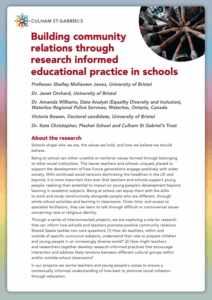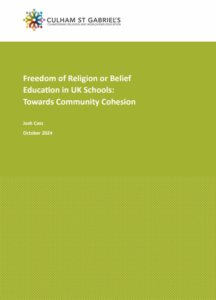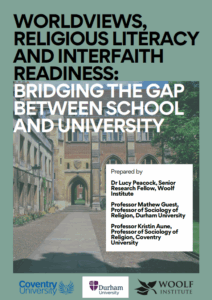Promoting Positive Community Relations
Culham St Gabriel’s Trust views religion and worldview literacy and interfaith and belief dialogue as vital contributors to positive community relations and global citizenship. Our approach is rooted in promoting dialogic approaches, and inclusive engagement across diverse, particularly educational, communities and contexts. This aligns with our broader strategic vision of contributing to a well-informed, respectful and open society.
Key principles of our approach:
- Interfaith and belief dialogue as a tool for connection: Culham St Gabriel’s supports educational projects and initiatives that use interfaith and belief dialogue to build bridges between communities, reduce prejudice, and foster mutual understanding and respect.
The Open University grant funded project aims to promote the adoption of a Docutube method in schools and wider community as a creative, reflective and critical approach to religion and worldviews education. The project offers teacher training, scopes the method’s use in new settings, and demonstrate how it can build better understanding between young people in divided communities. See for example: https://www.reonline.org.uk/research/research-of-the-month/retopea/
Educational empowerment: Culham St Gabriel’s fund initiatives that model a religion and worldviews approach to enquiry and dialogue in home and school environments, helping parents and children engage meaningfully with diverse beliefs.
The Faith and Belief Forum have a grant for a project embedding the lived experiences of diverse faiths and beliefs into school life through storytelling and encounter, the project aims to foster meaningful interfaith and belief dialogue, build social and emotional learning in students, and strengthen the role of schools as hubs of community cohesion in collaboration with local faith communities. See for example: https://faithbeliefforum.org/resources/
- Addressing prejudice and trauma: Through grants, Culham St Gabriel’s support activities that mark events like Holocaust Memorial Day, as well as projects which seek to combat antisemitism, Islamophobia and other forms of religious or racial hatred. We promote interfaith and belief engagement to confront identity-based prejudice and promote healing. We actively advocate for freedom of religion or belief through education.
Portsmouth and Winchester Diocesan Board of Education have been awarded a grant for Project Roots. This project aims to address antisemitism in UK primary schools by equipping RE teachers with resources to teach Christianity – especially Easter – in a thoughtful and responsible way. Developed with educators and Jewish community members, the project offers practical tools and training. It aims to build teacher confidence, encourage critical thinking in pupils, and challenge harmful stereotypes, fostering long-term culture change in schools and communities.
- Promoting religion and worldview literacy in the public square: Educational projects funded by Culham St Gabriel’s aim to deepen understanding of religious and non-religious traditions, enhancing empathy and civic engagement. We actively support Interfaith Week with blog posts, events and resources.
The Religion and Belief Literacy Partnership grant funded project aims to develop a religious literacy standard for public sector organisations. The standard will offer a means of assessing the progress that public sector organisations are making with their literacy in faith and beliefs, helping to drive improvements in policy and delivery. The current phase of the project focuses on assessment design and testing the standard with a range of agencies and bodies.
We encourage partner organisations and interested individuals to use the following briefing papers in advocacy work:
Building community relations through research informed educational practice in schools (2023)
Towards community cohesion (2025)
Worldviews, religious literacy and Interfaith Readiness (2024)


